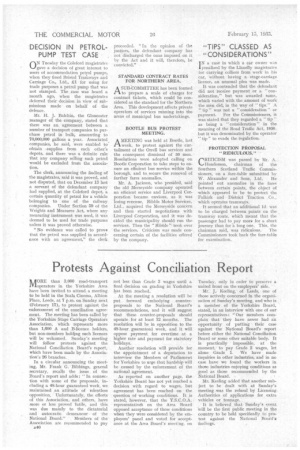Protests Against Conciliation Report
Page 56

If you've noticed an error in this article please click here to report it so we can fix it.
/10RE than 8,000 road-transport IVioperators in the Yorkshire Area have been invited to attend a meeting to be held in the Scala Cinema, Albion Place, Leeds, at 7 p.m. on Sunday next (February 17), to protest against the enforcement of the conciliation agreement. The meeting has been called by the Yorkshire Stage Carriage Operators Association, which represents more than 1,600 A and B-licence holders, but non-members holding such licences will be welcomed. Sunday's meeting will follow protests against the National Conciliation .Board's report, which have been made by the Associa
tion's 26 branches. • In a circular announcing the meeting, Mr. Frank G. Bibbings, general secretary, recalls the issue of the Board's report and adds: " In connection with some of the proposals, including a 48-hour guaranteed week, we maintained an attitude of relentless opposition. Unfortunately, the efforts of this Association, and others, have more or less proved futile, and this was due mainly to the dictatorial and autocratic demeanour of the National Board." Members of the Association are recommended to pay u40 not less than Grade 3 wages until a final decision on grading in Yorkshire has been reached,
At the meeting a resolution will be put forward embodying counterproposals to the National Board's recommendations, and it will suggest that these counter-proposals should operate for at least 12 months. The resolution will he in opposition to the 48-hour guaranteed week, and it will oppose payment for overtime at a higher rate and payment for statutory holidays.
Another resolution will provide for the appointment of a deputation to interview the Members of Parliament for Yorkshire to urge that hardship will be caused by the enforcement of the national agreement.
As reported on another page, the Yorkshire Board has not yet reached a decision with regard to wages, but agreement has been reached on the question of working conditions. It is stated, however, that the Y.S.C.O.A. representativds on the Area Board opposed acceptance of these conditions when they Were considered by the employers' panel and voted for acceptance at the Area Board's meeting, on Tuesday, only in order to preserve a united front on the employers' side.
Mr. J. Keeling, of Leeds, one of those actively concerned in the organization of Sunday's meeting, and who is a member of the Yorkshire Board, stated, in an interview with one of our representatives : "Our members complain that they have never had an opportunity of putting their case against the National Board's report before either the National Conciliation Board or some other suitable body. It is practically impossible, at the moment, to pay Grade 2 wages, let alone •Grade 1. We have made inquiries in other industries, and in no case have we found the workers in those industries enjoying conditions as good as those recommended by the Naticnal Board.
Mr. Keeling added that another subject to be dealt with at Sunday's meeting was the refusal by Licensing Authorities of applications for extra vehicles or tonnage.
It is believed that Sunday's event Will be the first public meeting in the country to be held specifically to protest against the National Board's find i n gs.




























































































